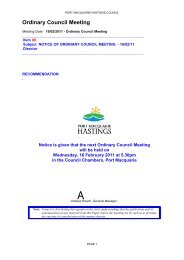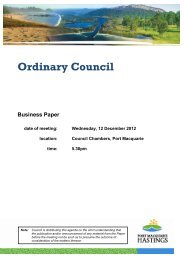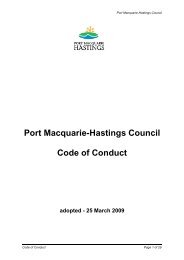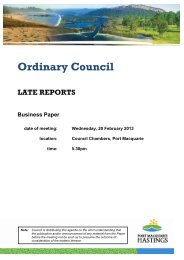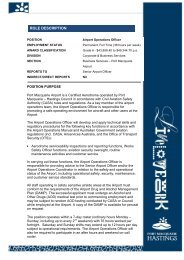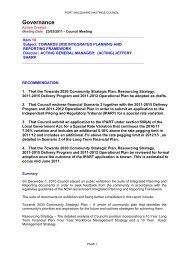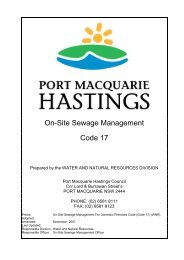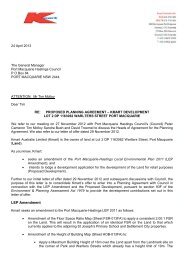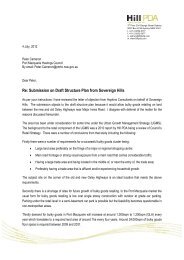Fluoridation - Hastings Council
Fluoridation - Hastings Council
Fluoridation - Hastings Council
You also want an ePaper? Increase the reach of your titles
YUMPU automatically turns print PDFs into web optimized ePapers that Google loves.
Water <strong>Fluoridation</strong> in Port<br />
Macquarie-<strong>Hastings</strong><br />
On August 6, 2004 after weeks of careful review following<br />
referral to an expert committee, NSW Health approved the<br />
addition of fluoride to the Port Macquarie-<strong>Hastings</strong> District<br />
Water Supply.<br />
Port Macquarie-<strong>Hastings</strong> is one of three councils on the<br />
NSW Mid North Coast whose community does not benefit<br />
from fluoridated tap water.<br />
In February 2012, in an effort to reduce the occurences<br />
of tooth decay in our community, Port Macquarie-<strong>Hastings</strong><br />
<strong>Council</strong> will join many other NSW cities currently providing<br />
90 per cent of the population with fluoridated water.<br />
How much fluoride is added?<br />
Fluoride is added to achieve a concentration of 1mg/litre<br />
(1ppm) +/- 5% (allowable range is 0.95ppm to 1.05ppm).<br />
The operation of the centralised fluoridation dosing plant<br />
will initially result in a gradual increase in the level of<br />
fluoride provided to the majority of water consumers.<br />
This gradual increase in fluoride content will be due to the<br />
initial dilution of the fluoridated water (1 mg/L of fluoride<br />
content) which is piped into the Port Macquarie Off-Creek<br />
Storage Dam. The existing stored water in the dam has a<br />
natural level of fluoride of approximately 0.1 mg/L.<br />
Based upon the current level of water demands, it is<br />
estimated that it could take between 6 to 12 months for<br />
the fluoride level to reach 1 mg/L in the water stored in the<br />
Port Macquarie Off-Creek Storage Dam.<br />
This will also be the case when Cowarra Off-Creek Storage<br />
Dam is brought online to supply water directly to the<br />
Camden Haven area. The timing of this operational<br />
arrangement is subject to the construction of a new water<br />
supply trunkmain currently planned for completion by 2018.<br />
Residents in Wauchope including Beechwood, Rawdon<br />
Island, Sancrox and Thrumster areas, who receive water<br />
directly from the Rosewood Road Reservoir, will be provided<br />
almost immediately with a fluoride content of 1 mg/L.<br />
The information in this brochure is provided by and<br />
endorsed by the NSW Ministry of Health.<br />
FURTHER INFORMATION:<br />
Website: www.fluoridenow.com.au<br />
www.pmhc.nsw.gov.au/fluoridation<br />
For health questions related to fluoridation contact the NSW<br />
Centre for Oral Health Strategy on (02) 8821 4300 or by<br />
email to cohs@wsahs.nsw.gov.au<br />
<strong>Fluoridation</strong><br />
Port Macquarie-<strong>Hastings</strong><br />
District Water Supply
Why fluoridate water when fluoride is<br />
widely available from other sources?<br />
The number of ways in which exposure to fluoride may occur<br />
has increased in recent decades.<br />
In Australia, the main fluoride vehicles are water fluoridation<br />
and toothpaste with fluoride.<br />
The changing pattern of fluoride exposure has accentuated<br />
the need to determine the relative benefits of fluoride from<br />
water versus other contemporary sources.<br />
Current research in Australia has demonstrated a continued<br />
benefit of fluoridation in dental decay prevention.<br />
These findings show that dental decay was lower among<br />
children in fluoridated than non-fluoridated areas.<br />
This indicates that water fluoridation provides decayprevention<br />
benefits additional to those provided by<br />
exposure to other fluoride sources alone.<br />
Most toothpaste that is manufactured in Australia<br />
contains fluoride.<br />
Analysis of the interaction of teeth brushing frequency with<br />
lifetime exposure to water fluoridation has indicated that<br />
even among children brushing regularly there is a 24%<br />
advantage of lifetime exposure to water fluoridation over<br />
those with no exposure.<br />
Water fluoridation has been rated in the top<br />
10 public health achievements of the 20th<br />
century by the Centre for Disease Control in<br />
the USA.<br />
Why is fluoridation used?<br />
Water fluoridation has been found to be effective in<br />
preventing dental decay, even in the presence of other<br />
fluoride vehicles such as toothpaste with fluoride.<br />
Water fluoridation reduces socio-economic inequalities in<br />
decay experience in children. There is a clear social justice<br />
argument for both the continuation and expansion of water<br />
fluoridation.<br />
Water fluoridation remains the most effective and socially<br />
equitable measure of achieving community-wide reduction<br />
in dental decay.<br />
Why fluoridate water?<br />
Over 100 studies in more than 20 countries have shown<br />
that fluoridation reduces dental decay, which explains the<br />
high priority given to water fluoridation by public health<br />
authorities.<br />
Many millions of people throughout the world now receive<br />
drinking water with controlled fluoride concentrations;<br />
including nearly 2 in 3 Australians, with fluoridated water<br />
supplies in all capital cities.<br />
Many small communities in NSW also now have access to<br />
fluoridated water. Approximately 95% of New South Wales’<br />
population has access to fluoridated water.<br />
Water fluoridation benefits anyone<br />
with natural teeth<br />
The belief that only children benefit from fluoride is<br />
outdated. While fluoride incorporated into forming tooth<br />
enamel before eruption may help to prevent decay, the<br />
presence of fluoride at the surfaces of teeth after eruption<br />
has been shown to be the main mode of action.<br />
It is for this reason that the beneficial effect of fluoride is<br />
available to individuals of all ages with teeth.<br />
Is water fluoridation safe?<br />
Water fluoridation has been established as a safe and<br />
effective public health procedure. According to the National<br />
Health and Medical Research <strong>Council</strong> (2007) “The existing<br />
body of evidence strongly suggests that fluoridation is<br />
beneficial for reducing dental decay.”





